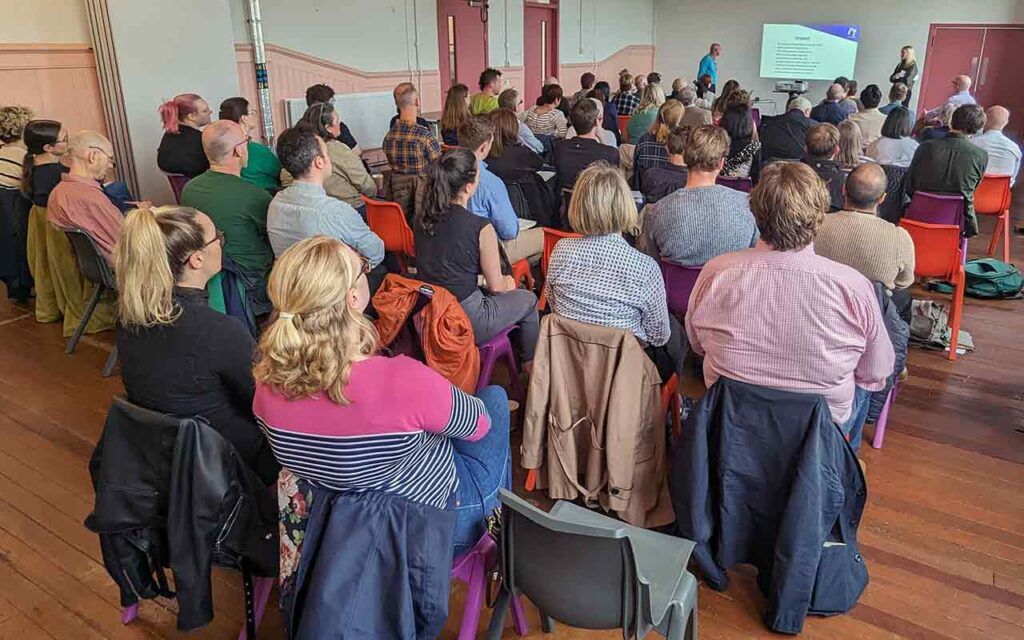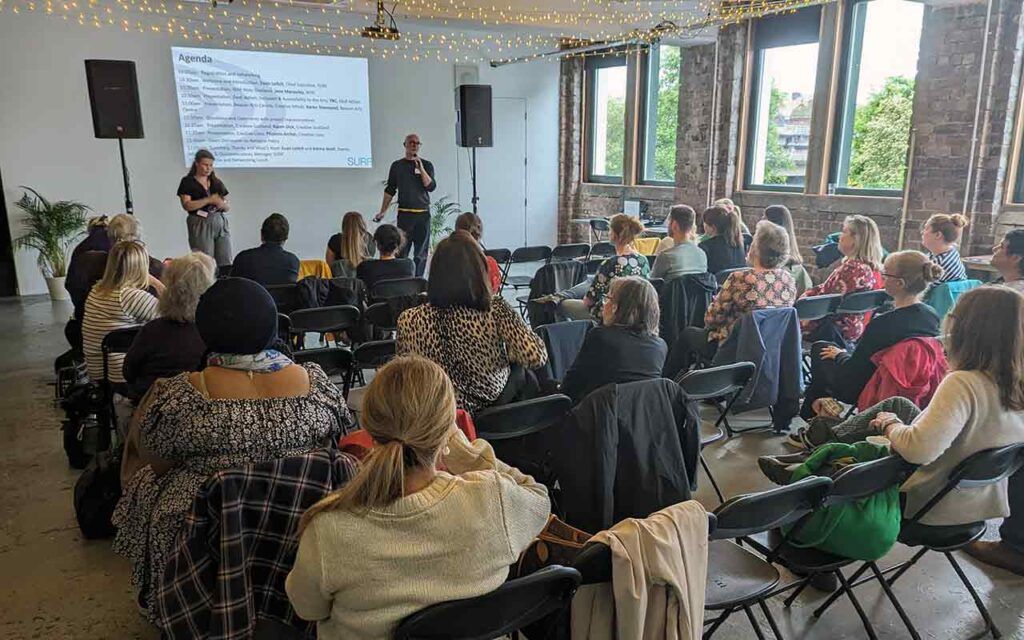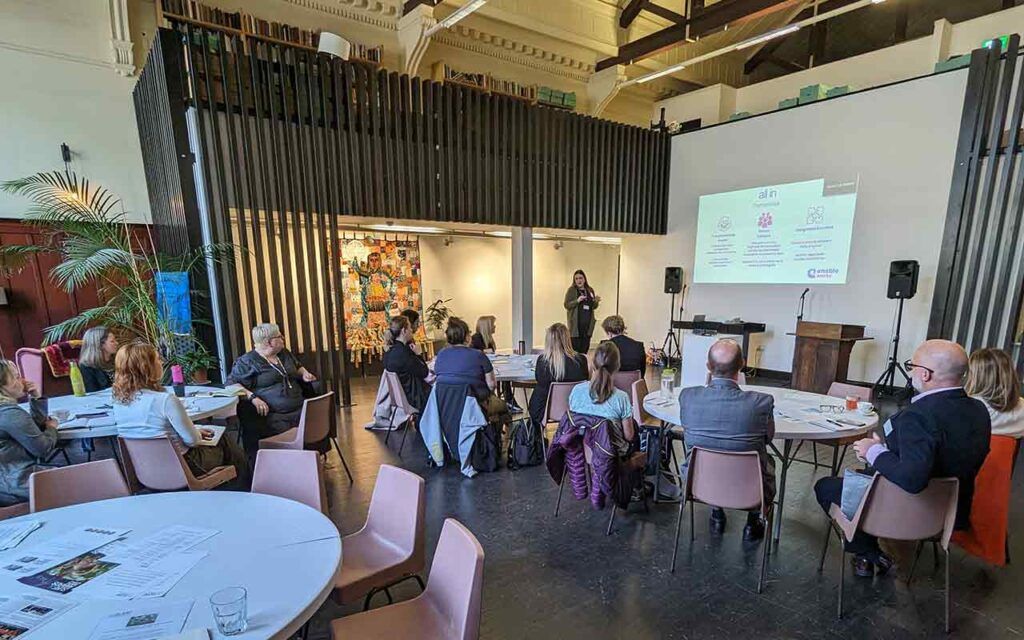Overview
Each year, the SURF Awards for Best Practice in Community Regeneration highlights contemporary examples of ‘what works’ in interventions that improve struggling places across Scotland.
The SURF Awards, which celebrated its 25th anniversary last year, is delivered in partnership with the Scottish Government and judged by independent experts. 15 projects are shortlisted in five thematic categories, profiled in an annual publication, and showcased in a popular awards ceremony, providing a valuable bank of good practice and transferable learning.
As part of the process, six months on from announcing the results, SURF arranges a series of in-person shared learning workshop events in central Scotland with representatives from winning and shortlisted projects. The objective is to delve deeper into projects recognised in the SURF Awards and ask: what useful takeaways can help the wider regeneration practitioner community in Scotland to improve their own approaches and initiatives?
The workshops were held in Glasgow and Edinburgh in May 2024, with a combined attendance of 244. This policy briefing considers our 2024 shared learning events series, and draws out practical policy ideas highlighted through presentations and discussions with the SURF Award projects highlighted in last year’s iteration.
Please click here for a full report on the SURF Awards workshop series.
Policy Outcomes In Brief
The following eight policy recommendations were identified from the workshops:
Overcoming Barriers to Employability
- Prioritise quality over quantity, accepting that employability support is a long-term investment that can’t be done quickly or on the cheap.
- Make it easier for people to learn about the employability support opportunities available in their local area through community-based promotional activities and partnerships.
Housing led Regeneration
- Attach mixed use elements to affordable housing developments in rural Scotland to improve project viability and accrue greater socio-economic outcomes.
- Encourage more local authority led programmes to retrofit flats in urban Scotland, where poverty and mixed tenures prevent organic action.
Improving Scotland’s Places & Community Led Regeneration
- Do more to promote community led place planning through funding, case studies, peer learning and community group support mechanisms.
- Investigate the scope for subsidised community food shops and poverty service hubs in areas with severe levels of food poverty that do not have a comparable service.
Creative Approaches to Community Regeneration
- Utilise social media influencers to promote the outcomes of local regeneration activity, including tourism and cultural opportunities, to new audiences.
- Increase the provision of festivals that combine cultural opportunities with social regeneration to deliver added values for people and places.
In Depth
Overcoming Barriers to Employability
Our first workshop event in the series took place in Glasgow Women’s Library and focused on learning outcomes from the employability category, with project managers from ABZWorks Employability Support in Aberdeen, Enable Works’ ‘All in Dundee’ initiative, and the Clyde Gateway supported Topgolf Recruitment in Rutherglen.
The project managers agreed that going at service user’s pace is key to making an impact in supporting disengaged young people into employment and skills training in the current context.
Lori Leslie of Aberdeen City Council said a genuine ‘no one left behind’ approach to employability is far from easy, given the time and energy staff must devote to engaging with the disengaged, building trust, managing expectations and navigating a difficult economic and funding landscape. Patience is, however, a non-negotiable; everyone from policy-makers and funders to project managers and front-line staff must accept this, and build outcomes sustainably on a long-term engagement with service users.
Audience questions invoked a discussion on the wide-ranging expectations on many employability professionals, who typically spend only some of their time doing things a lay person might expect in helping people into work. In reality, much of their time is spent on reaching potential service users, building relationships with them, and addressing the barriers they might be dealing with, from housing and mental health to child care and managing finances. This involves listening to problems, making referrals as appropriate, and demonstrating resilience when setbacks happen.
The first policy recommendation emerging from the workshop is to direct more resources to the employability projects that deal with a relatively low number of service numbers over a long engagement process. This allows a project the time and space required to help people overcome the challenges that prevent them from taking on available opportunities.
With rising pressures and restricted costs, it can be logical for everyone in employability to try to do more with less, but this will not lead to the outcome everyone is seeking – a pathway into sustainable employment. A one-to-one, comprehensive and individually tailored long-term programme is high-cost, but high-benefit, and the best value for public money compared to high-volume approaches with modest or poor outcomes. A 12 week skills training programme with no pre-engagement, post-programme support or link with local employers was given as an example of a low-cost employability project that was ineffective in the current economy.
A second recommendation is to declutter the landscape by making it easier for people to learn about and access appropriate services in their communities. Gemma Falconer of Enable Works said 175k people in Scotland have a learning disability, and that the charity had gone to some lengths to reach people where they live, including in Dundee through the ‘All in Dundee’ project, and offer them the services and support they need to access the labour market.
Niki Spence of Clyde Gateway also spoke of the importance of focusing on local people as beneficiaries. There is limited value in creating opportunities in an area with a low supply of jobs, if those opportunities go to those living outside the area. Topgolf Recruitment’s local support and partnership activities led to 78% of the 300 jobs created going to those who live close to the Rutherglen venue. Again, this involved some decluttering by investing time to liaise with multiple partners to reach local people and promote the opportunities created.
Several participants raised examples of nationwide patchiness in employability. In some areas, service provision is difficult to find and access, while in others people can be left confused by various actors and initiatives. Improvements can be made on all sides of the employability landscape to make it easier for people to learn about, understand and engage with local services.
Housing led Regeneration
The second SURF Awards workshop explored effective approaches to housing led regeneration, with the projects shortlisted in the SURF Awards category for housing: the Goathill Housing and Care Home Project on the Isle of Lewis, the City of Edinburgh Council’s Mixed Tenure Improvement Scheme, and South of Scotland Community Housing’s (SOSCH) development of new housing and improved community facilities in the village of Glentrool in Galloway Forest Park.
The workshop featured a tale of two Scotlands, one set in deprived, high-density urban centres, another in fragile rural communities. Participants heard about the particular value housing led regeneration can deliver in both settings, in reversing different kinds of decline. The event was held in Edinburgh’s Grassmarket Community Project.
Dan McPhail of Comhairle Nan Eilean Siar (formerly Western Isles Council) and Mike Staples of SOSCH, leading figures respectively in the Goathill and Glentrool developments, both spoke of the particular challenges of housing provision in rural Scotland. Demand for affordable housing is high, while community and health facilities are often lacking, and a need for care home places are largely unmet, as demonstrated by extensive waiting lists.
These are ‘push’ factors towards rural depopulation, which further exacerbates social and economic challenges in villages, small towns and islands across the country. Much-needed regeneration interventions can fight against depopulation pressures by retaining residents and attracting new ones through affordable housing provisions that also meet other local needs.
The Goathill and Glentrool developments show that mixed use approaches can address two problems at the same time – raising the funding needed for viable rural developments, while making the locality a more attractive and sustainable home in the long-term. “Adding on” a care home, community hub, tourist accommodation, cafe and/or other important local amenity can tap into non-housing funding capital, while increasing quality of life in for people in the new housing development, and the wider locality. This could, and should, be encouraged by policy.
It’s not quite that simple, however. Both Dan and Mike spoke of the considerable complexities involved at all stages of their projects, from partnership building and fundraising to construction and maintenance. Their advice? Maintain a clear vision throughout, and build robust partnerships that engage in continuous communications, not just when problems arise. Most importantly, focus all attention on delivering the needs of the local community at all times. They agreed that creative problem solving is a key skill in these endeavours.
Dan also spoke of the particular vulnerabilities associated with ferry dependency, labour and contractor availability, high rainfall, and difficulties with construction material transport, in the Scottish islands. In this context, he felt broad, nationwide housing supply targets distort the market and benefit the central belt, where these factors don’t add to costs, and hinder delivery to tight timescales.
Speaking to a very different urban context in the capital city, Mark Connelly shared his project’s story of retrofitting homes for energy efficiency in Wester Hailes. The focus was on local social housing built in the 1950s and 1960s. The UK Government ownership push in the 1980s left a legacy of mixed tenure. As a result, the City of Edinburgh Council’s large-scale retrofitting programme – 1400 flats in 181 blocks – had to engage with private rental tenants, social housing tenants, housing associations, landlords and owner-occupiers.
With the flats in six or eight blocks, it fundamentally wasn’t possible to get action and investment from owners and residents without a regeneration intervention, which was highly necessary as Mark said some of the buildings were in a state of extreme disrepair. The £30m programme, which involved roof repairs, exterior refurbishment, thermal efficiency measures and more, resulted in warmer homes, better neighbourhoods and improved pride of place.
SURF workshop participants agreed that policy measures could be adopted elsewhere to provide similar initiatives, given that much of post-industrial central Scotland faces similar challenges. Housing and regeneration project officers in attendance agreed that building homes can be the easy part – looking after them is the bigger challenge. When different tenures lead to inaction, and the challenge is compounded by low incomes, buildings cannot be left to decay, and the public sector must intervene.
Improving Scotland’s Places & Community Led Regeneration
Another SURF Awards workshop explored the linked SURF Awards community led and improving places categories, and brought together the two category winners: the Vibrant Gala Project – a community led revitalisation of Galashiels – and the Govan Pantry, which supports people experiencing food poverty in Govan, Glasgow.
The event was held in a community owned building, the Kinning Park Complex in south Glasgow, a former tram depot which now provides a hub for community activities and classes. Ian Dalgliesh, Chair of Energise Galashiels Trust, opened the event by sharing the impressive range of holistic improvements his community group delivered. The Trust worked across physical, social and economic regeneration with a myriad of partner bodies and businesses to re-establish Galashiels town centre as a vibrant and welcoming place.
Ian said the community had been left frustrated by a lack of action despite long-standing concerns about a fading town centre, and by a 2018 failure to get a Business Improvement District (BID) up and running. The community and other partners decided to focus on a series of actions, including improving 35 properties, putting on events, producing public artworks and creating a new BID for Galashiels.
One goal for the Trust was to focus on providing a quality town centre for local people, rather than tourists – the theory being, solve the town centre’s problems for its residents, and people will want to visit. Key to the Trust’s success was in project planning: the introduction of Local Place Plans, the Place Standard Tool, the Place Principle and more have proved helpful in demonstrating community demands for change and providing a route for the community into regeneration partnership working.
A workshop discussion indicated that while regeneration policy is generally supportive of community led place planning, two things were missing from the mix – adequate resources to supporting scaling up across the country, and clear information for helping community groups who don’t know where to start, including through case studies and peer networking. With emerging good practice around Local Place Plans and linked community led regeneration activity profiled by SURF, the Scottish Community Development Centre and others, some optimism for the future was aired at the workshop.
Participants also heard from Viv Sawers and Stephen McFadden from Govan HELP, which operates the Govan Pantry initiative. A charity formed in 1996 by a Primary School in Govan to support families in poverty to work through their challenges, Govan HELP now provides a range of services for the community, including family support and counselling. It won a SURF Award for its subsidised community shop, Govan Pantry.
Viv and Stephen spoke of the emergence of the Pantry from a Covid response food bank service, and the local need for a prolonged service that now helps more than 3000 members access “the John Lewis” of pantry services to alleviate food poverty. The Pantry combines a dignified approach to offering low food prices and good quality, for £100k a year running costs. But the real value of the project comes from relationship-building with service users and its function as a springboard to other services – such as help for children who have experienced trauma, developing volunteering skills, and helping new Scots who don’t speak English to access local services and opportunities.
“Is this project being replicated elsewhere?” was one question posed at the workshop. While some other community projects were cited, “not really” was the response. A clear policy recommendation is to look into setting others up, in communities with high levels of food poverty that don’t have an existing service.
A workshop discussion also indicated a general perception that front-line community workers are having to deal with more people with poor mental health, as compared to pre-Covid, and require appropriate training and support.
Creative Approaches to Community Regeneration
The workshop series concluded on the theme of creative regeneration, which looked at the successful application of creative arts and culture into regeneration initiatives. This event was held in the community and co-working space Civic House in north-central Glasgow.
Workshop participants exchanged with project managers in the three shortlisted projects in the creative regeneration category: Wild Skies Shetland, which encourages locals and visitors to appreciate the dramatic skies of Unst, Deaf Action Scotland’s Edinburgh Deaf Festival, and the Creative Minds community arts festival in Greenock’s Beacon Arts Centre.
Representing the Wild Skies initiative, Jane Macaulay spoke of the hard work her volunteer-run Wild Skies Shetland community group had engaged in to benefit local people and visitors with activities connected to the constantly changing and beautiful Unst sky. With Unst suffering from a fragile local economy, a lack of arts venues, and limited things for local people and visitors to do, Wild Skies sought to bridge these gaps with stimulating initiatives including a Planterary Trail, a Sky Trail with 13 stops, collaborative film-making, live music events, and more.
The project employs a part-time staff members, improves the wellbeing of local people, and benefits the island economy through enhanced tourism and the provision of contracts. One element behind its success is the use of social media influencers, who were invited to visit, and were delighted to promote their good experiences to young people, travellers and trip-seekers via content on TikTok and elsewhere. A workshop exchange resulted in an agreement that more places with regeneration activity should use this approach to capture their achievements and popularise their appeal across age groups.
Philip Gerard of Deaf Action Scotland shared the story of Edinburgh Deaf Festival, which promotes inclusion to the arts by providing a dedicated programme for the deaf community, including performers and audience members, during the Edinburgh Festival. The inaugural Deaf Festival took place in August 2022, reaching over 2000 people, and is now set to become a permanent feature. Philip explained that the Deaf Festival is not just about events in Edinburgh in August, however, and spoke of the year-round activities, workshops and training with deaf artists that nurture talent, with potential to feed into other festivals.
Karen Townsend of Beacon Arts Centre provided an overview of the Creative Minds community arts festival, which matched a range of community groups in Greenock and Inverclyde with an artist, supported a five month engagement process, and hosted the resulting outcome in a two-day festival. The art exhibitions, performances, demonstrations and talks that grew out of the collaboration featured in a popular and well-received multi-day festival that promoted the rich cultural life of Greenock alongside the work of community groups, including those active in mental health and recovery support.
The two festivals indicate the potential for realising the Culture Strategy Action Plan targets around ‘Transforming through Culture’ and ‘Empowering through Culture’. Festivals are a relatively low-cost, high-profile way of delivering added values for people and places, providing tangible outcomes, new opportunities and fresh hope.
Workshop participants agreed that creative regeneration initiatives like these lead to significant improvements in social cohesion, pride of place, prospects for enhanced employment and education, and mental wellbeing. The takeaway? Scotland needs more of this.
Further Information
These recommendations will feed into SURF’s policy influencing activities. Further information on our policy initiatives are available here.
You can read more about all projects shortlisted, including profiles, website links and project contact details, in the 2023 SURF Awards publication.
A full report on the workshop series covered in this briefing is available here: Shared Learning Report



